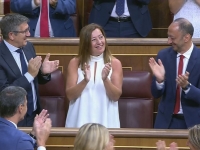Politics
Starts the XV legislature of the Spanish democracy
Armengol, president of the Parliament
USPA NEWS -
The XV legislature of Spanish democracy started this Thursday with the constitution of the Parliament resulting from the legislative elections held on July 23. The Catalan socialist Francine Armengol was elected president of the Congress of Deputies by an absolute majority.
Armengol is a socialist politician who defends the Catalan right to decide on its independence and amnesty for Catalan politicians convicted of the 2017 secessionist attempt. According to several Spanish media, his election as the third authority of the State was possible after the commitment of the still president of the Spanish Government, the also socialist Pedro Sánchez, to pardon the separatists and promote constitutional changes so that the Catalans can hold a self-determination referendum.
After the constitution of the Parliament, the next thing will be the election of the president of the Spanish Government. The legislative elections on July 23 were won by the conservative Popular Party. This Thursday, the conservatives lost the presidency of Congress because the far-right deputies of Vox abstained in the vote, in protest for having been left out of the Parliament Council. However, the conservative Popular Party has an absolute majority in the Senate. His dominance in this chamber, through which almost all the laws approved by Congress must pass and without whose validation they cannot enter into force, anticipates a difficult legislature if the current president of the Spanish Government, Pedro Sánchez, repeats in office.
Because the choice of Prime Minister is not clear. Custom dictates that King Felipe VI entrust the formation of the Government to the winner of the legislative elections. But the conservative leader, Alberto Núñez Feijóo, does not have the necessary support to be elected. His opponent, Socialist candidate and current acting Prime Minister Pedro Sánchez, could wrest the presidency from him if he receives the votes of Basque nationalists, Basque and Catalan separatists, and other regionalist parties.
The majority obtained by the conservatives in the legislative elections was so meager that, if Núñez Feijóo were elected Prime Minister, the socialist-independence bloc could block the action of his government. And if the Prime Minister were the socialist Pedro Sánchez, the absolute majority of the conservatives in the Senate would prevent the approval of laws. Technically, Spain will be ungovernable and the Spanish are headed for a repeat election next December.
Liability for this article lies with the author, who also holds the copyright. Editorial content from USPA may be quoted on other websites as long as the quote comprises no more than 5% of the entire text, is marked as such and the source is named (via hyperlink).






